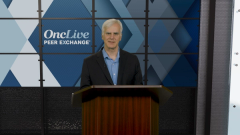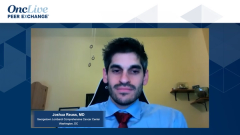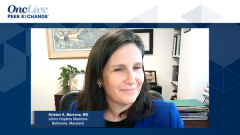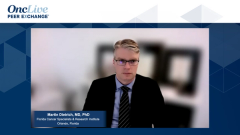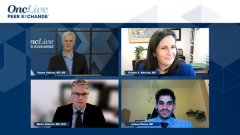
Resectable Non–Small Cell Lung Cancer: Neoadjuvant Treatment Strategies
Focused discussion on the selection of neoadjuvant therapy in patients with resectable NSCLC in light of recent clinical trials.
Episodes in this series

Transcript:
Balazs Halmos, MD, MS: Kristen, could you introduce us to the evolving neoadjuvant literature and how that might impact this particular patient’s case?
Kristen A. Marrone, MD: There has been a lot in the neoadjuvant perioperative space in the past year, and I think we are going to be seeing an explosion of more data and lots of questions about this soon.
Right now what we have available to us is already approved. We know neoadjuvant chemotherapy is an option. But what has been recently approved is the CheckMate 816 [trial] [NCT02998528] data, looking at adding neoadjuvant nivolumab to chemotherapy. Both the patient and tumor characteristics would make this patient a viable candidate for a potentially neoadjuvant approach. The multidisciplinary team should be available to the patient in real time because everybody wants treatment decisions quickly. This is a potentially curative situation, so we want to make sure that everything from the pulmonary function test to the surgical evaluation to the PET to the brain MRI are all done quickly.
We are thinking more and more about how to use molecular data to inform these options. We know the CheckMate 816 data excluded EGFR- and ALK-positive tumors. Trying to integrate that amount of molecular testing into the neoadjuvant space is a huge logistical barrier across a lot of clinics, so as a community, we need to think a lot about that. Dr [Patrick] Forde published the study in the New England Journal [of Medicine] in 2022. It was a phase 3 study looking at neoadjuvant, 6 weeks [of] nivolumab, plus chemotherapy, compared to chemotherapy alone. Their primary end point was pathologic complete response and median event-free survival, which ended up being about 31.6 months at the first presentation. Then the pathologic complete response was 24%, compared to 2% with chemotherapy alone. That was statistically significant, and it’s really exciting for our patients, which led to its FDA approval.
Interestingly, we saw trends toward benefit regardless of PD-L1 status. We saw trends toward improvement in outcome, especially in higher-stage disease. We saw patients were able to tolerate the therapy and the surgery. The neoadjuvant immunotherapy did not preclude them getting to the surgery safely, so our surgeons are well-situated to perform the lifesaving surgery. All of that was really exciting data, and it has led to us thinking about this much differently than even a year or two ago.
What else has come out is the NADIM II study [NCT03838159], which was looking at neoadjuvant chemotherapy [with] nivolumab, followed by 6 months of adjuvant nivolumab, compared to chemotherapy alone in stage III disease. That data was recently presented, which showed significantly improved pathologic complete response. They also were able to provide some PFS [progression-free survival] rates at 12 and 24 months, and also showed significantly improved overall survival rates at both 12 and 24 months. I think these studies are the first of many to show us what potential benefit there is for immunotherapy in this early-stage setting. We’re going to have a lot of data coming at us, about how to select patients, what to use pre [and] post [therapy], [and] what pathologic complete response really means. Can we use that to extrapolate who needs IO [immunotherapy] later on? We are going to hear about adjuvant immunotherapy soon, and how to integrate all of that into this.
The last study that I should talk about is the AEGEAN study [NCT03800134], which was just announced. [It’s] a phase 3 study using durvalumab in combination with neoadjuvant chemotherapy that showed a statistically significant and meaningful improvement in pathologic complete response, compared [with] chemotherapy alone. I would love to hear what everybody is thinking about this data and how you are treating patients. I can certainly say it has changed how I’ve been treating my patients. This is something we’re trying to offer to most people, especially if they are deemed to be surgically resectable.
Balazs Halmos, MD, MS: This has been transformational. Just to put it in perspective: The pathological CR [complete response] rate for the TPS [tumor proportion score], high-positive patients, went from 5% to 45%. By the time of surgery, half of the patients are tumor-free. We have been hearing surgeons telling us that they have taken the whole thing out. Now we can tell them that we medical oncologists made the cancer go away by the time they take the patient to the OR [operating room]. Do you look at the TPS in your treatment selection? What are you thinking in terms of when you’re seeing a patient in front of you?
Joshua Reuss, MD: I would say that the PD-L1 is less informative to me for whether or not to go with the CheckMate 816 regimen. For me, it’s the mutational analysis, which I think is a very difficult situation in the neoadjuvant setting. In that scenario, molecular testing is the easiest. You’ve got tons of tissue [and] patients are recovering from surgery. In the neoadjuvant setting, when you are dealing with a small bronchoscopy sample that needs some limited IHCs [immunohistochemistries] and then you do full NGS [next-generation sequencing], the question is, do you do a limited panel where you look for EGFR, ALK, or KRAS, to get that information before you start systemic therapy? Do you give a cycle of chemotherapy alone and try to do the full NGS and then add in IO, and give three cycles of [the CheckMate 816 regimen]? I am more concerned with turnaround time.
Transcript edited for clarity.


